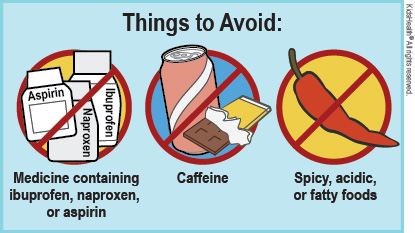Gastritis: How to Care for Your Child
Gastritis is inflammation (irritation and swelling) of the stomach lining. Kids with gastritis can have stomach pain or discomfort, bloating, heartburn, nausea, vomiting, or a feeling of fullness even when they haven't eaten. Medicine and diet changes can help kids with gastritis feel better.


-
Give your child any prescribed medicines as directed.
-
Do not give your child ibuprofen (such as Advil®, Motrin®, or a store brand) or naproxen (such as Aleve®, Anaprox®, or a store brand) unless the doctor says it's OK, because they can irritate the stomach.
-
For mild pain or fever, you can give your child acetaminophen (such as Tylenol® or a store brand).
-
Do not give aspirin to your child or teen, as it has been linked to a rare but serious illness called Reye syndrome.
-
Small changes to the diet sometimes help. These can include:
-
eating 5–6 small meals a day instead of 3 large meals
-
avoiding foods that make your child feel worse. These may include spicy, acidic, or fatty foods.
-
avoiding caffeine, which can make gastritis symptoms worse. Caffeine is in coffee, tea, many sodas, and chocolate.
-
Make sure your child knows that drinking alcohol and smoking can make gastritis worse.
-
Make any follow-up appointments as directed.

Your child:
-
loses weight or grows taller without gaining weight
-
is not eating a nutritious diet
-
is not drinking the usual amount of liquids
-
has diarrhea
-
has bloody or black poop
-
feels unusually weak or tired
-
has new or worsening symptoms, or is not feeling better with the recommended treatment

Your child:
-
has vomit that is bloody or that looks like coffee grounds
-
has severe belly pain
-
is vomiting a lot and can't keep fluids down
-
appears dehydrated; signs include dizziness, drowsiness, a dry or sticky mouth, sunken eyes, crying with little or no tears, or peeing less often (or having fewer wet diapers)

What causes gastritis? Sometimes the cause of gastritis isn't known. Other times it can be caused by:
-
an infection due to bacteria called H. pylori
-
some medicines
-
some medical conditions
-
extreme stress to the body, such as from a serious injury
How is gastritis treated? Treatment depends on the cause. Avoiding medicines and foods that irritate the stomach is an important part of treatment. The health care provider might give antibiotics if there is an infection. Other medicines can help the stomach make less acid or protect it from the acid it makes.